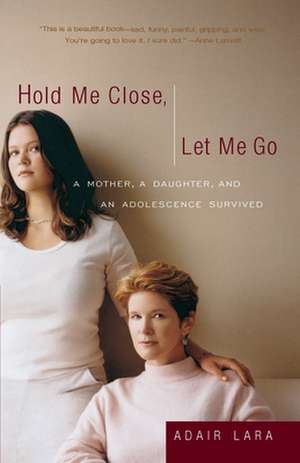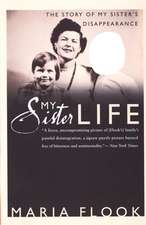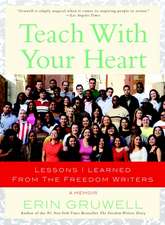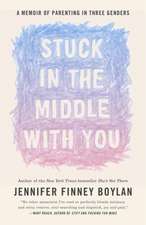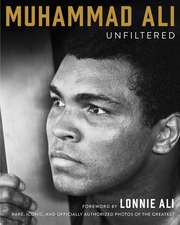Hold Me Close, Let Me Go: A Mother, a Daughter and an Adolescence Survived
Autor Adair Laraen Limba Engleză Paperback – 28 feb 2002
When Adair Lara’s daughter Morgan turned thirteen, she was transformed, seemingly overnight, from a sweet, loving child into an angry, secretive teenager who would neither listen nor be disciplined. The author, her youngest son, Patrick, her ex-husband, Jim, and her new husband, Bill, all stepped on a five-year roller-coaster ride in which Morgan incarnated the chaos principle in torn jeans and dyed hair. Drinking, drugging, disappearing, suspicious companions, failing and cheating at school, joy riding in a stolen car–there was no variety of adolescent acting out that she didn’t indulge in. For Adair Lara it became an endless sojourn at the end of her rope, a trial immensely complicated by the reappearance in her life of her aging father, a man who had abandoned his wife and seven children decades earlier. Inevitably, Morgan’s misbehavior revives memories of her own headstrong adolescence, while her father’s presence makes agonizingly real for her the consequences of giving up. Paradoxically, he also becomes the source of her best advice.
Hold Me Close, Let Me Go is an emotionally charged, often brutally honest memoir that all parents (and anyone who was ever a teenager) will experience shocks of recognition from while reading. It imparts invaluable lessons about holding loved ones close through the roughest passages and about the power of family to overcome the most grievous obstacles. Adair Lara is a clear-eyed and eloquent witness to the complex costs and rewards of motherhood, and her book will redefine for readers their idea of what being “a good enough mother” really means.
Preț: 111.99 lei
Nou
Puncte Express: 168
Preț estimativ în valută:
21.43€ • 22.29$ • 17.96£
21.43€ • 22.29$ • 17.96£
Carte disponibilă
Livrare economică 20 februarie-06 martie
Preluare comenzi: 021 569.72.76
Specificații
ISBN-13: 9780767905084
ISBN-10: 0767905083
Pagini: 288
Dimensiuni: 141 x 212 x 17 mm
Greutate: 0.35 kg
Editura: BROADWAY BOOKS
ISBN-10: 0767905083
Pagini: 288
Dimensiuni: 141 x 212 x 17 mm
Greutate: 0.35 kg
Editura: BROADWAY BOOKS
Notă biografică
ADAIR LARA is an award-winning newspaper columnist whose column appears twice weekly in the San Francisco Chronicle. She is the author of five books, including Welcome to Earth, Mom; Slowing Down in a Speeded-Up World;and her latest, The Best of Adair Lara. Her articles and essays have appeared in Redbook, Ladies’ Home Journal, Parenting, Good Housekeeping, Reader’s Digest and other national publications. She lives in San Francisco; her daughter Morgan has just graduated from the University of California at Santa Cruz.
Extras
Chapter 1
MORGAN was still asleep, though it was almost eleven. The light from her west-facing window washed the top half of her face and her tumbled hair, the same brownish-blond as her brother Patrick's. One pink foot stuck out. I sat on the edge of the bed and shook it.
"Mom, I was sleeping." She smiled lazily at me.
"Is it true that last night you and Tara went into Dolores Park?"
"Mom, what are you talking about?" Morgan, caught off guard, sat up, trying for an expression of injured innocence.
"Did you?"
"What park?"
"Dolores. Where the drug dealers hang out."
"Well, yes, but we were totally safe." She said it with a little shrug.
"What about the beer?" I said in a tight voice. "Tara said something about a six-pack."
"It was just sitting in a bag in a parking lot. I didn't drink any of the beer. It was sour. I just sprayed it on the ground. God, Mom. You're overreacting, just the way Daddy always does." She slumped down, then, in a sudden change of mood, grinned at me. "It was worth it. It was the most fun I ever had in my life. The only problem was getting caught."
"Fun? You could have been raped or murdered, two young girls out on the streets. Don't you remember those two girls on Potrero Hill who were just standing on a corner when a gang of boys took them off to a shed and raped them five or six times each? They were only thirteen, like you and Tara."
"I'll be fourteen in two months, and anyway my friends wouldn't let anything happen to me," Morgan said confidently. "If anybody tried to hurt us, we'd kick them in the you know where."
I was getting nowhere, so I stood up. Having a thirteen-year-old was like having your own personal brick wall. The phone rang. I found it under a pile of junk on Morgan's floor.
"Hello?"
"Hello!" said a familiar gravelly voice.
"Dad?"
"In the flesh."
"Where are you?"
"In the valley, in my hidey hole."
"Your hidey hole?" My head was still full of Morgan. It had been years since I'd seen my father or heard his voice. I swallowed. "How long have you been back?"
"Couple of months. I was wondering if you could find it in your heart to come out here today to see your poor old dad."
"I can't. I'm on deadline." I wrote a column for the San Francisco Chronicle on Tuesdays and Thursdays. "And the kids start school tomorrow."
"I know you're busy, but I need you to come out here. Jesus Christ, I haven't laid eyes on you in five years. For all I know, you're taller."
"Dad, I told you . . ."
"Besides, it's an emergency."
"An emergency?" I couldn't help the frosty tone of my voice. "Are you in jail?"
"No, I'm not in jail. Tell you when you get here."
"Hey, let me talk to my grandpa!" Morgan yelled.
"Shush! I can't hear him!"
My dad had said something, but I missed it. "I'm sorry, Dad, I was talking to Morgan. Listen, I'm not coming out there."
"Come on," he urged. "You can tell me what a rotten father I've been."
"You have been a rotten father."
"Come on. You'll be back by early afternoon."
"Maybe next weekend."
I could hear Dad sigh. "Why are all you kids so angry?" he asked. "I gave you everything you ever asked for." He paused. "Except, of course, for the basic necessities. Those I left to your saintly mother." He paused, and I heard him sigh again. "All right, see you when I see you."
The phone clicked in my ear.
"I thought Grandpa was in the desert. Is he back? Where is he?" Morgan was up, pulling a pair of corduroy overalls over the T-shirt she had slept in.
"I'm not sure. In Marin County somewhere. I'm going out to see him."
"I want to come!"
"I'm sorry," I said in the snappish new way I had of talking to her. "You are grounded for the rest of your life." She had been sneaking out of the house for months now, and I always grounded her, for what little good it seemed to do.
I left her and tried to return to my column. But the sound of jackhammering outside the window kept distracting me, and I was restless and unable to concentrate. Outside a man lifted a piece of cardboard out of a stack someone had left on the corner. I watched as he shaped it back into a box, then flattened it again and walked off with it.
I called my twin sister, Adrian, reaching her at the Ukiah County Courthouse, where she was the civil clerk. She wasn't surprised to hear from me. We talked to each other three or four times a day.
"Hey, hag."
"Hag yourself."
"Guess what."
"What?"
"Dad's back."
"He is? Where is he?"
"In his hidey hole, he said, which I guess means somewhere out in the San Geronimo Valley. He just called, wants me to go see him. Says it's an emergency."
"Are you going?"
"No. I have my hands full here. Guess what Morgan's done now. Sneaked out last night with one of her little friends and went out roaming the streets."
"How did you catch her?"
"Tara spilled the beans to her mother this morning, and her mom called me."
"And now Dad's back."
"Yeah."
"Well, good luck."
I hung up, went into the kitchen, and grabbed my purse and keys. Since I had to finish a column, my husband, Bill, had gone off early for a hike on Mount Tamalpais with friends. Bill was not Morgan's dad but my second husband (well, technically my third), who had arrived on the scene when Morgan was eleven and Patrick ten. Today Patrick was playing basketball down at the rec center.
Where had Dad said he was?
I drove north across the Golden Gate Bridge, and followed Highway 101, Mount Tamalpais looming on my left. I took the exit to Sir Francis Drake Boulevard, which runs north and then west through central Marin County and out to the ocean. The air was warmer, and I rolled down the window.
After Fairfax, the foothill called White's Hill reared in front of me, warning me and everyone else that we were leaving the land of lawns, sidewalks, and brunch and entering San Geronimo Valley, in the last pocket of hills before the rolling grasslands that lead to the coast.
The road flattened out on the other side. Coming into the valley with its golden hills felt like driving into my own childhood, into those scenes that lay in the back of my mind like short videotapes, jerky and slow, like the Super 8 movies my mother used to take of us.
When I was little, Dad was the sound of hammering, the stray scent of tobacco and sawdust, the roar of a truck starting up, a man holding an anvil over his head for the camera. "I couldn't stand myself then," he told me once, "but I had all those lovely muscles." He was on the edge of my world, as I was on his: "You were always twisted around something in the foreground," he told me in a letter, "part of your mother's entourage." We were living in this valley then, a large unruly Irish-American family struggling along on the wages of a journeyman carpenter who only worked in good weather. Dad stayed until I was ten, when he was carried away on a high-cresting wave of Schlitz. Mom tried for years after he left to get the seven of us to call him Gene and hate him for deserting us, but we still sometimes slipped out, in ones and twos, to wherever he was, to drink his instant coffee and watch him strum the guitar that he never did learn to play.
When he was sixty-five, after he had realized his shoulders were shot and was wondering what he would do when he could no longer work at all, Dad discovered he was eligible for social security.
A man who up until that minute had worked for every dime, he sat turning that first check over and over in his hands.
The possibility that he might be eligible for social security had not occurred to him. A man who has never voted, seldom made enough money to pay taxes, a man whose driver's license was revoked after he dreamily drove a car over a cliff and then walked away unhurt for about the fifteenth time--this is not a man who figures that the laws he has devoted his life to thwarting are going to underwrite the comforts of his old age.
That's when he left for the desert. "I waited until my dotage to break loose," he wrote me, "underwritten by Reagan's few dollars. It's enough to make a cat cry. It puts a terrible strain on better late than never."
He'd been out in the Mojave Desert for five years, living in his truck. Cruising down the road, with his dog Fred riding shotgun.
I woke from my reveries as I flashed by my old Mexican stucco school, now a community center. Dad had said he was in his hidey hole. What did that mean?
I reached Forest Knolls, the middle of the three little valley towns stretched along Sir Francis Drake Boulevard, and parked in front of the Lodge, a whitewashed stucco building with a few pickups parked at odd angles in front of it. I stepped into the gloom and waited for my eyes to adjust, but I could already tell he wasn't here, at his old stool at the bar, drinking a Coors under the dusty beer mobiles.
A young woman who stood behind the counter, watching the TV screen, swung around when the door creaked shut behind me. "You're a Daly, aren't you?" she said as I was turning to go. "One of the twins?"
"Yes, I'm Adair," I said. "Adrian's living up north in Ukiah." I had recognized her too. "You're Susan. One of the Dugans."
When I was growing up here, San Geronimo Valley was filled with big families--the Dugans, the Neilsens, the Weavers, the Dalys--each yard filled with kids racing around long past dusk, their white T-shirts blurring in the dim light. In each family, even ours, the kids looked so much alike that you could spot them anywhere. The Dugans were dark, with pug noses and huge eyes. We were paler, with thick hair, small noses, and brown eyes.
"I heard you moved to the city," Susan said.
"Yes, I've been there twenty years now." I had come over to the bar, and moved my sleeve so she could wipe down the corner. Her family had added some modern features to the bar over the years--a laser disc jukebox and a large screen TV, and a sign advertising margaritas. "I'm looking for my dad. Have you seen him?"
"No, not for years. Not since he took off for the desert. His tools are still stored down in our basement."
AFTER I left the Lodge I tried a grassy hill up the road, where Dad had lived in his truck for a while near the house of his best friend, John Ericson, another feckless father of a large family. All I found was an empty Camel pack in the grass that had grown back. I crushed it in my hand.
I decided that he must be back at the ranch. The Richardson ranch sprawls between the old twisting back road and the hills of Woodacre. The Richardsons used to let Dad park his truck there for a dollar a day while he built porches and fixed screen doors to keep himself in bananas and tobacco and used paperbacks.
I drove around the circular driveway twice, past barns, sheds, and corrals full of horses flicking their tails in the heat, before I noticed, deep in a corner near some blackberry bushes, his truck with that lazy curl of smoke coming from the vent cut through its roof. His old sign was tacked to the limb of an oak tree: carpentering. shoddy work, high prices. inquire within. I smiled despite myself and stopped the car. I got out, sniffing appreciatively at the smell of alfalfa coming from the barn.
"Is that you there, Adair?" Iris Richardson was hurrying toward me across the circular driveway, her thin figure lost in a sweatshirt and jeans rolled up at the ankles. Iris owned the ranch.
"I'm looking for my dad," I said.
"I haven't seen him," Iris said, "but when you find him you can tell the son of a bitch for me he has until dark to remove his vehicle from this ranch. He tore up my entire kitchen floor, then he went to town for the new tiles. That was yesterday at noon, and I haven't seen him since. I can't go into my own kitchen for fear of falling into the basement."
"I said I'll fix it, and I will," said Dad's voice, and there he was, walking up the dirt driveway, carrying a bag that said "Fairfax Hardware" on it in red letters. He wore jeans and a gray sweatshirt, and his graying curls were squashed under a filthy black Giants cap. His face was deeply lined, and his whole body seemed shrunken, smaller. His white-and-black mongrel, Fred, trotted ahead of him eagerly.
I waited for him, feeling as if I was consciously standing my ground.
"Dare!" he said, stopping a few feet away. "Good to see you."
"Hi, Dad. What's this about an emergency?"
"Come into the house," he said, bending back a branch so I could enter his truck. "I'll tell you all about it."
"What about me?" demanded Iris, her voice shrill. "Aren't you even going to explain why you disappeared, leaving me without a kitchen floor? You promised it would take four hours!"
"And it will," Dad said. "Now let me talk with my daughter a minute, can you? It's not every day she comes out to see her old father."
"We'll see about this!" said Iris, storming off, her feet kicking up dust clouds as she strode back to the farmhouse.
"Come in, tell me what's shaking," Dad said again. He patted the side of the van. It was a 1949 green panel bakery van. You could still read bordenave in faint white letters on the side. Fred nosed my ankle, and I reached down to scratch his ears.
"What do you think of it? I pulled it free of the weeds growing up through its floorboards. Now we adventure together."
"Does it run?"
"Sure does. It's not much on hills--not much on level ground either really," he said, patting it again, then catching himself doing it, and smiling ruefully. "Goes like hell downhill, though, and that's where I'm heading, according to most reports." He opened the door, motioning me to climb in ahead of him. "And lookee here. Spare tire, wood burning stove, air mattress. I even figured out how to hold down the heat by a judicious use of draft controls. By God, it's a functional success, whatever they may say at the sanity hearing."
MORGAN was still asleep, though it was almost eleven. The light from her west-facing window washed the top half of her face and her tumbled hair, the same brownish-blond as her brother Patrick's. One pink foot stuck out. I sat on the edge of the bed and shook it.
"Mom, I was sleeping." She smiled lazily at me.
"Is it true that last night you and Tara went into Dolores Park?"
"Mom, what are you talking about?" Morgan, caught off guard, sat up, trying for an expression of injured innocence.
"Did you?"
"What park?"
"Dolores. Where the drug dealers hang out."
"Well, yes, but we were totally safe." She said it with a little shrug.
"What about the beer?" I said in a tight voice. "Tara said something about a six-pack."
"It was just sitting in a bag in a parking lot. I didn't drink any of the beer. It was sour. I just sprayed it on the ground. God, Mom. You're overreacting, just the way Daddy always does." She slumped down, then, in a sudden change of mood, grinned at me. "It was worth it. It was the most fun I ever had in my life. The only problem was getting caught."
"Fun? You could have been raped or murdered, two young girls out on the streets. Don't you remember those two girls on Potrero Hill who were just standing on a corner when a gang of boys took them off to a shed and raped them five or six times each? They were only thirteen, like you and Tara."
"I'll be fourteen in two months, and anyway my friends wouldn't let anything happen to me," Morgan said confidently. "If anybody tried to hurt us, we'd kick them in the you know where."
I was getting nowhere, so I stood up. Having a thirteen-year-old was like having your own personal brick wall. The phone rang. I found it under a pile of junk on Morgan's floor.
"Hello?"
"Hello!" said a familiar gravelly voice.
"Dad?"
"In the flesh."
"Where are you?"
"In the valley, in my hidey hole."
"Your hidey hole?" My head was still full of Morgan. It had been years since I'd seen my father or heard his voice. I swallowed. "How long have you been back?"
"Couple of months. I was wondering if you could find it in your heart to come out here today to see your poor old dad."
"I can't. I'm on deadline." I wrote a column for the San Francisco Chronicle on Tuesdays and Thursdays. "And the kids start school tomorrow."
"I know you're busy, but I need you to come out here. Jesus Christ, I haven't laid eyes on you in five years. For all I know, you're taller."
"Dad, I told you . . ."
"Besides, it's an emergency."
"An emergency?" I couldn't help the frosty tone of my voice. "Are you in jail?"
"No, I'm not in jail. Tell you when you get here."
"Hey, let me talk to my grandpa!" Morgan yelled.
"Shush! I can't hear him!"
My dad had said something, but I missed it. "I'm sorry, Dad, I was talking to Morgan. Listen, I'm not coming out there."
"Come on," he urged. "You can tell me what a rotten father I've been."
"You have been a rotten father."
"Come on. You'll be back by early afternoon."
"Maybe next weekend."
I could hear Dad sigh. "Why are all you kids so angry?" he asked. "I gave you everything you ever asked for." He paused. "Except, of course, for the basic necessities. Those I left to your saintly mother." He paused, and I heard him sigh again. "All right, see you when I see you."
The phone clicked in my ear.
"I thought Grandpa was in the desert. Is he back? Where is he?" Morgan was up, pulling a pair of corduroy overalls over the T-shirt she had slept in.
"I'm not sure. In Marin County somewhere. I'm going out to see him."
"I want to come!"
"I'm sorry," I said in the snappish new way I had of talking to her. "You are grounded for the rest of your life." She had been sneaking out of the house for months now, and I always grounded her, for what little good it seemed to do.
I left her and tried to return to my column. But the sound of jackhammering outside the window kept distracting me, and I was restless and unable to concentrate. Outside a man lifted a piece of cardboard out of a stack someone had left on the corner. I watched as he shaped it back into a box, then flattened it again and walked off with it.
I called my twin sister, Adrian, reaching her at the Ukiah County Courthouse, where she was the civil clerk. She wasn't surprised to hear from me. We talked to each other three or four times a day.
"Hey, hag."
"Hag yourself."
"Guess what."
"What?"
"Dad's back."
"He is? Where is he?"
"In his hidey hole, he said, which I guess means somewhere out in the San Geronimo Valley. He just called, wants me to go see him. Says it's an emergency."
"Are you going?"
"No. I have my hands full here. Guess what Morgan's done now. Sneaked out last night with one of her little friends and went out roaming the streets."
"How did you catch her?"
"Tara spilled the beans to her mother this morning, and her mom called me."
"And now Dad's back."
"Yeah."
"Well, good luck."
I hung up, went into the kitchen, and grabbed my purse and keys. Since I had to finish a column, my husband, Bill, had gone off early for a hike on Mount Tamalpais with friends. Bill was not Morgan's dad but my second husband (well, technically my third), who had arrived on the scene when Morgan was eleven and Patrick ten. Today Patrick was playing basketball down at the rec center.
Where had Dad said he was?
I drove north across the Golden Gate Bridge, and followed Highway 101, Mount Tamalpais looming on my left. I took the exit to Sir Francis Drake Boulevard, which runs north and then west through central Marin County and out to the ocean. The air was warmer, and I rolled down the window.
After Fairfax, the foothill called White's Hill reared in front of me, warning me and everyone else that we were leaving the land of lawns, sidewalks, and brunch and entering San Geronimo Valley, in the last pocket of hills before the rolling grasslands that lead to the coast.
The road flattened out on the other side. Coming into the valley with its golden hills felt like driving into my own childhood, into those scenes that lay in the back of my mind like short videotapes, jerky and slow, like the Super 8 movies my mother used to take of us.
When I was little, Dad was the sound of hammering, the stray scent of tobacco and sawdust, the roar of a truck starting up, a man holding an anvil over his head for the camera. "I couldn't stand myself then," he told me once, "but I had all those lovely muscles." He was on the edge of my world, as I was on his: "You were always twisted around something in the foreground," he told me in a letter, "part of your mother's entourage." We were living in this valley then, a large unruly Irish-American family struggling along on the wages of a journeyman carpenter who only worked in good weather. Dad stayed until I was ten, when he was carried away on a high-cresting wave of Schlitz. Mom tried for years after he left to get the seven of us to call him Gene and hate him for deserting us, but we still sometimes slipped out, in ones and twos, to wherever he was, to drink his instant coffee and watch him strum the guitar that he never did learn to play.
When he was sixty-five, after he had realized his shoulders were shot and was wondering what he would do when he could no longer work at all, Dad discovered he was eligible for social security.
A man who up until that minute had worked for every dime, he sat turning that first check over and over in his hands.
The possibility that he might be eligible for social security had not occurred to him. A man who has never voted, seldom made enough money to pay taxes, a man whose driver's license was revoked after he dreamily drove a car over a cliff and then walked away unhurt for about the fifteenth time--this is not a man who figures that the laws he has devoted his life to thwarting are going to underwrite the comforts of his old age.
That's when he left for the desert. "I waited until my dotage to break loose," he wrote me, "underwritten by Reagan's few dollars. It's enough to make a cat cry. It puts a terrible strain on better late than never."
He'd been out in the Mojave Desert for five years, living in his truck. Cruising down the road, with his dog Fred riding shotgun.
I woke from my reveries as I flashed by my old Mexican stucco school, now a community center. Dad had said he was in his hidey hole. What did that mean?
I reached Forest Knolls, the middle of the three little valley towns stretched along Sir Francis Drake Boulevard, and parked in front of the Lodge, a whitewashed stucco building with a few pickups parked at odd angles in front of it. I stepped into the gloom and waited for my eyes to adjust, but I could already tell he wasn't here, at his old stool at the bar, drinking a Coors under the dusty beer mobiles.
A young woman who stood behind the counter, watching the TV screen, swung around when the door creaked shut behind me. "You're a Daly, aren't you?" she said as I was turning to go. "One of the twins?"
"Yes, I'm Adair," I said. "Adrian's living up north in Ukiah." I had recognized her too. "You're Susan. One of the Dugans."
When I was growing up here, San Geronimo Valley was filled with big families--the Dugans, the Neilsens, the Weavers, the Dalys--each yard filled with kids racing around long past dusk, their white T-shirts blurring in the dim light. In each family, even ours, the kids looked so much alike that you could spot them anywhere. The Dugans were dark, with pug noses and huge eyes. We were paler, with thick hair, small noses, and brown eyes.
"I heard you moved to the city," Susan said.
"Yes, I've been there twenty years now." I had come over to the bar, and moved my sleeve so she could wipe down the corner. Her family had added some modern features to the bar over the years--a laser disc jukebox and a large screen TV, and a sign advertising margaritas. "I'm looking for my dad. Have you seen him?"
"No, not for years. Not since he took off for the desert. His tools are still stored down in our basement."
AFTER I left the Lodge I tried a grassy hill up the road, where Dad had lived in his truck for a while near the house of his best friend, John Ericson, another feckless father of a large family. All I found was an empty Camel pack in the grass that had grown back. I crushed it in my hand.
I decided that he must be back at the ranch. The Richardson ranch sprawls between the old twisting back road and the hills of Woodacre. The Richardsons used to let Dad park his truck there for a dollar a day while he built porches and fixed screen doors to keep himself in bananas and tobacco and used paperbacks.
I drove around the circular driveway twice, past barns, sheds, and corrals full of horses flicking their tails in the heat, before I noticed, deep in a corner near some blackberry bushes, his truck with that lazy curl of smoke coming from the vent cut through its roof. His old sign was tacked to the limb of an oak tree: carpentering. shoddy work, high prices. inquire within. I smiled despite myself and stopped the car. I got out, sniffing appreciatively at the smell of alfalfa coming from the barn.
"Is that you there, Adair?" Iris Richardson was hurrying toward me across the circular driveway, her thin figure lost in a sweatshirt and jeans rolled up at the ankles. Iris owned the ranch.
"I'm looking for my dad," I said.
"I haven't seen him," Iris said, "but when you find him you can tell the son of a bitch for me he has until dark to remove his vehicle from this ranch. He tore up my entire kitchen floor, then he went to town for the new tiles. That was yesterday at noon, and I haven't seen him since. I can't go into my own kitchen for fear of falling into the basement."
"I said I'll fix it, and I will," said Dad's voice, and there he was, walking up the dirt driveway, carrying a bag that said "Fairfax Hardware" on it in red letters. He wore jeans and a gray sweatshirt, and his graying curls were squashed under a filthy black Giants cap. His face was deeply lined, and his whole body seemed shrunken, smaller. His white-and-black mongrel, Fred, trotted ahead of him eagerly.
I waited for him, feeling as if I was consciously standing my ground.
"Dare!" he said, stopping a few feet away. "Good to see you."
"Hi, Dad. What's this about an emergency?"
"Come into the house," he said, bending back a branch so I could enter his truck. "I'll tell you all about it."
"What about me?" demanded Iris, her voice shrill. "Aren't you even going to explain why you disappeared, leaving me without a kitchen floor? You promised it would take four hours!"
"And it will," Dad said. "Now let me talk with my daughter a minute, can you? It's not every day she comes out to see her old father."
"We'll see about this!" said Iris, storming off, her feet kicking up dust clouds as she strode back to the farmhouse.
"Come in, tell me what's shaking," Dad said again. He patted the side of the van. It was a 1949 green panel bakery van. You could still read bordenave in faint white letters on the side. Fred nosed my ankle, and I reached down to scratch his ears.
"What do you think of it? I pulled it free of the weeds growing up through its floorboards. Now we adventure together."
"Does it run?"
"Sure does. It's not much on hills--not much on level ground either really," he said, patting it again, then catching himself doing it, and smiling ruefully. "Goes like hell downhill, though, and that's where I'm heading, according to most reports." He opened the door, motioning me to climb in ahead of him. "And lookee here. Spare tire, wood burning stove, air mattress. I even figured out how to hold down the heat by a judicious use of draft controls. By God, it's a functional success, whatever they may say at the sanity hearing."
Recenzii
“An honest, moving account of family life gone haywire.” –Kirkus Reviews
“Adair Lara has transcended the genre of self to achieve selflessness. Her story of abiding love and pure anguish is a must-readÉand for any parent, Lara’s book will be a beacon.” –Jacquelyn Mitchard, author of The Deep End of the Ocean
“Lara’s memoir is in equal parts disturbing and absorbing, primarily because of [her] ability to acknowledge--and ultimately accept responsibility for--her initial eagerness to deny that her daughter’s life was going awry...Her yarn is told from the heart” –New York Newsday
“Adair Lara has transcended the genre of self to achieve selflessness. Her story of abiding love and pure anguish is a must-readÉand for any parent, Lara’s book will be a beacon.” –Jacquelyn Mitchard, author of The Deep End of the Ocean
“Lara’s memoir is in equal parts disturbing and absorbing, primarily because of [her] ability to acknowledge--and ultimately accept responsibility for--her initial eagerness to deny that her daughter’s life was going awry...Her yarn is told from the heart” –New York Newsday
Descriere
What does a mother do when her teenaged daughter is spinning out of control and nothing is bringing her back? A searingly honest memoir of motherhood, "Hold Me Close, Let Me Go" is a testament to the power of love and family.
